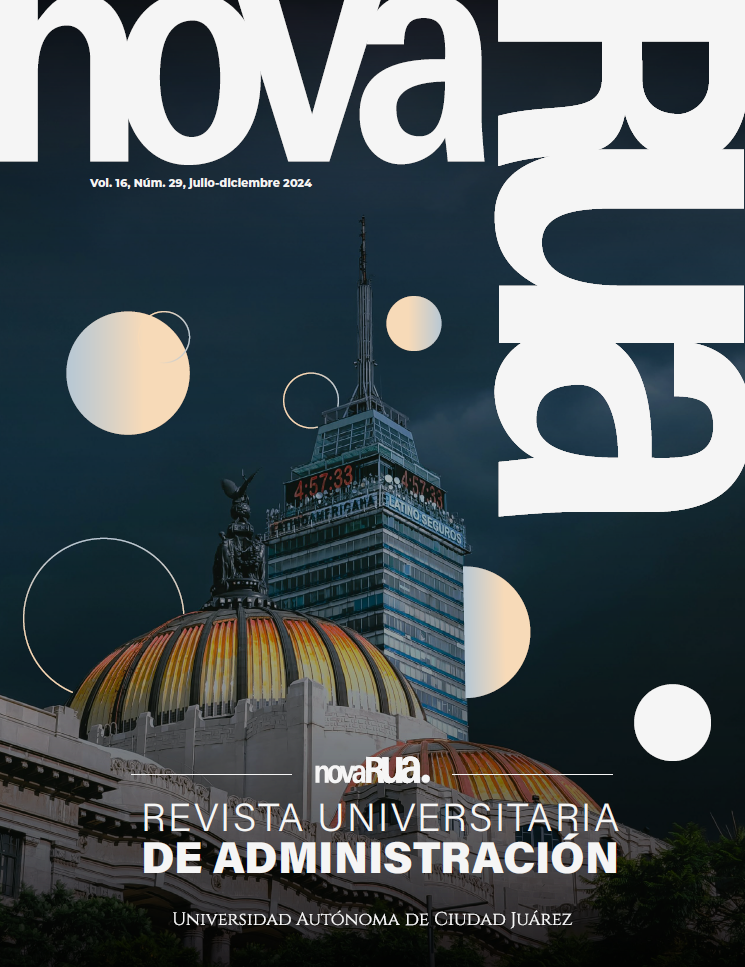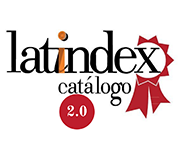Marco metodológico para la gestión sistémica del conocimiento
DOI:
https://doi.org/10.20983/novarua.2024.29.3Palabras clave:
Transformación digital y cognitiva, Gestión del Conocimiento, Enfoque Sistémico, Representación del Conocimiento, KMoS-SSAResumen
La tecnología desempeña un papel fundamental, influyendo en todos los aspectos de nuestra vida y marcando el comienzo de una era de transformación digital y cognitiva; aquellos que se adaptan a esta ingresan en la Era Cognitiva, donde la Inteligencia Artificial y las Tecnologías de la Información brindan soporte en la toma de decisiones. No obstante, esta transición puede generar ansiedad debido a la necesidad de implementar cambios organizacionales y tecnológicos rápidos y a menudo inadecuados, propiciados por una simplificación excesiva de dominios complejos para que sean más accesibles a la IA y las TI. Este artículo presenta el marco metodológico KMoS-SSA como una herramienta integradora que fusiona la Gestión del Conocimiento con el Enfoque Sistémico para desarrollar soluciones efectivas en dominios complejos. Este enfoque integral reconoce la importancia del conocimiento tácito de los especialistas y ofrece una vía adecuada para enfrentar desafíos asociados con la transformación digital y cognitiva.
Citas
Aviad, A., Węcel, K., y Abramowicz, W. (2016). A Semantic Approach to Modelling of Cybersecurity Domain. Journal of Information Warfare, 15(1), 91-102. https://www.jstor.org/stable/26487483.
Checkland, P. B. (1989). Soft Systems Methodology. Human Systems Management, 8(4), 273-289. https://doi.org/10.3233/hsm-1989-8405.
Checkland, P., y Poulter, J. (2020). Soft Systems Methodology. En Reynolds, M. y Holwell, S. (eds), Systems Approaches to Making Change: A Practical Guide. Springer. https://doi.org/10.1007/978-1-4471-7472-1_5.
De Mello, F. L. y De Carvalho, R. L. (2015). Knowledge Geometry. Journal of Information & Knowledge Management, 14(04), 1550028-1550028. https://doi.org/10.1142/s0219649215500288.
Farnese, M. L., Barbieri, B., Chirumbolo, A., y Patriotta, G. (2019). Managing Knowledge in Organizations: A Nonaka’s SECI Model Operationalization. Frontiers in Psychology, 10, 2730. https://doi.org/10.3389/fpsyg.2019.02730.
Gu, J. (2016). The Meta-synthesis System Approach. En Nakamori, Y. (Ed), Knowledge Synthesis. Translational Systems Sciences. Springer. https://doi.org/10.1007/978-4-431-55218-5_5.
Gu, J., y Tang, X. (2004). Wu-li Shi-li Ren-li system approach to a major project on the research of meta-synthesis system approach. International Journal of Knowledge and Systems Sciences, 1(1), 70-77. https://citeseerx.ist.psu.edu/document?repid=rep1&type=pdf&doi=5360c354d8e0fffe9e2e67dbf0de161e60c48352.
Hadi, A. H., Pramuhadi, G., Susantyo, B., y Wahyono, E. (2023). Sustainability Concept Design of Robusta Coffee Agroindustry Kalibaru with Soft System and Decisions Support System Methods. International Journal of Sustainable Development & Planning, 18(5), 1339-1350. https://doi.org/10.18280/ijsdp.180504.
Hanafizadeh, P., y Mehrabioun, M. (2022). The Nature of Hard and Soft Problems and Their Problem-Solving Perspectives. Journal of Systems Thinking in Practice, 1(3), 22-48. https://doi.org/10.22067/jstinp.2022.79419.1024.
Holste, J. S., y Fields, D. (2010). Trust and tacit knowledge sharing and use. Journal of Knowledge Management, 14(1), 128-140. https://doi.org/10.1108/13673271011015615.
Jackson, M. (2017). Engineering by Software: System Behaviours as Components. En Mazzara, M. y Meyer, B. (eds), Present and Ulterior Software Engineering. Springer. https://doi.org/10.1007/978-3-319-67425-4_1.
Jiménez-Galina, A., Olmos-Sánchez, K., Licona-Olmos, J., y Maldonado-Macias, A. (2023). Necesidad de una metodología para la representación del conocimiento para sistemas complejos en DEI. Enfoque empírico-teórico. 11th International Conference in Software Engineering Research and Innovation (CONISOFT). https://conisoft.org/2023/assets/docs/sessionprogram/SessionsProgram_CONISOFT-2023_v60_231030_230231.pdf.
Kotseruba, I., y Tsotsos, J. K. (2018). 40 years of cognitive architectures: core cognitive abilities and practical applications. Artificial Intelligence Review, 53(1), 17-94. https://doi.org/10.1007/s10462-018-9646-y.
Larson, E. J. (2021). The myth of artificial intelligence why computers can’t think the way we do. The Belknap Press of Harvard University Press.
Nakamori, Y. (2020). Fusing systems thinking with knowledge management. Journal of Systems Science and Systems Engineering, 29, 291-305. https://doi.org/10.1007/s11518-019-5450-8.
Nikhlis, N., Iriani, A., y Hartomo, K. D. (2020). Soft System Methodology (SSM) Analysis to Increase the Number of Prospective Students. INTENSIF: Jurnal Ilmiah Penelitian Dan Penerapan Teknologi Sistem Informasi, 4(1), 63-74. https://doi.org/10.29407/intensif.v4i1.13552.
Nonaka, I., y Takeuchi, H. (2016). The Knowledge-Creating Company: How Japanese Companies Create the Dynamics of Innovation. Hbs.edu. https://www.hbs.edu/faculty/Pages/item.aspx?num=38411.
Olmos-Sanchez, K., y Rodas-Osollo, J. (2020). Helping organizations manage the innovation process to join the Cognitive era. 8th International Conference in Software Engineering Research and Innovation (CONISOFT). https://doi.org/10.1109/conisoft50191.2020.00012.
Olmos-Sánchez, K., & Rodas-Osollo, J. (2016). A Strategy of Requirements Engineering for Informally Structured Domains. International Journal of Combinatorial Optimization Problems and Informatics, 7(2), 49-56. https://ijcopi.org/ojs/article/view/39.
Polanyi, M. (1958). Personal Knowledge. University of Chicago Press. https://philpapers.org/rec/POLPK-3.
Reynolds, M., y Holwell, S. (2020). Systems Approaches to Making Change: A Practical Guide. Springer. https://doi.org/10.1007/978-1-4471-7472-1.
Rodas-Osollo, J. (2023). An Interesting Adventure accompanied by CMCg.I model. Zenodo. https://doi.org/10.5281/zenodo.10111223.
Rodas-Osollo, J., y Olmos-Sánchez, K. (2022). Toward Optimization of Medical Therapies with a Little Help from Knowledge Management. IntechOpen. https://doi.org/10.5772/intechopen.101987.
Rodas-Osollo, J., Olmos-Sánchez, K., y Kotlyarova, I. (2024). A conceptual framework-KMoS-SSA: synergizing quality management and technology. Croatian Quality Managers Society. https://hdmk.hr.
Rodas-Osollo, J., Olmos-Sánchez, K., Portillo-Pizaña, E., Martínez-Pérez, A., y Alemán-Meza, B. (2021). An Archetype of Cognitive Innovation as Support for the Development of Cognitive Solutions in Smart Cities. En Ochoa, A, Vargas, G. y Espinosa, J. (Eds.), Innovative Applications in Smart Cities. CRC Press. https://www.taylorfrancis.com/chapters/edit/10.1201/9781003191148-8/archetype-cognitive-innovation-support-development-cognitive-solutions-smart-cities-jorge-rodas-osollo-karla-olmos-s%C3%A1nchez-enrique-portillo-piza%C3%B1a-andrea-mart%C3%ADnez-p%C3%A9rez-boanerges-alem%C3%A1n-meza.
Rohajawati, S., Fairus, S., Saragih, H., Akbar, H., y Rahayu, P. (2021). A combining method for systems requirement of knowledge-based medical hazardous waste. TEM Journal, 10(4), 1761-1768. https://www.proquest.com/scholarly-journals/combining-method-systems-requirement-knowledge/docview/2702222057/se-2.
Saadah H. (2010). Soft Systems Methodology in Environment-Aware Case-Based Reasoning System Analysis. Information Technology Journal, 9, 467-473. https://scialert.net/abstract/?doi=itj.2010.467.473.
Tona, O., & Asatiani, A. (2023). Designing digital solutions for sustainability: Navigating conflicting stakeholder requirements with dignity in mind. Journal of Information Technology Teaching Cases, 0(0). https://doi.org/10.1177/20438869231216995.
Trochim, W. M., Cabrera, D. A., Milstein, B., Gallagher, R. S., y Leischow, S. J. (2006). Practical Challenges of Systems Thinking and Modeling in Public Health. American Journal of Public Health, 96(3), 538-546. https://doi.org/10.2105/ajph.2005.066001.
Yang, J. T., y Wan, C. S. (2004). Advancing organizational effectiveness and knowledge management implementation. Tourism Management, 25(5), 593-601. https://doi.org/10.1016/j.tourman.2003.08.002.
Zahid, A., Sharma, R., Wingreen, S. C., y Anushia, I. (2022). Soft systems modelling of design artefacts for blockchain-enabled precision healthcare as a service. AIS Electronic Library (AISeL). https://aisel.aisnet.org/iceb2022/42/.
Descargas
Publicado
Número
Sección
Licencia
Derechos de autor 2024 Jorge Rodas-Osollo, Karla Olmos-Sánchez

Esta obra está bajo una licencia internacional Creative Commons Atribución-NoComercial-CompartirIgual 4.0.
Todos los contenidos de la edición electrónica de la revista se distribuyen bajo una licencia de uso y distribución “Creative Commons Reconocimiento-No Comercial-Compartir Igual 4.0 Internacional” (CC-BY-NC-SA). Puede consultar desde aquí la versión informativa de la licencia.
Aquellos autores/as que tengan publicaciones con esta revista, aceptan los términos siguientes: a) Los autores/as conservarán sus derechos de autor y garantizarán a la revista el derecho de primera publicación de su obra; b) Se permite y recomienda a los autores/as difundir su obra a través de Internet (p. ej.: en archivos telemáticos institucionales o en su página web), lo cual puede producir intercambios interesantes y aumentar las citas de la obra publicada. (Véase El efecto del acceso abierto).












